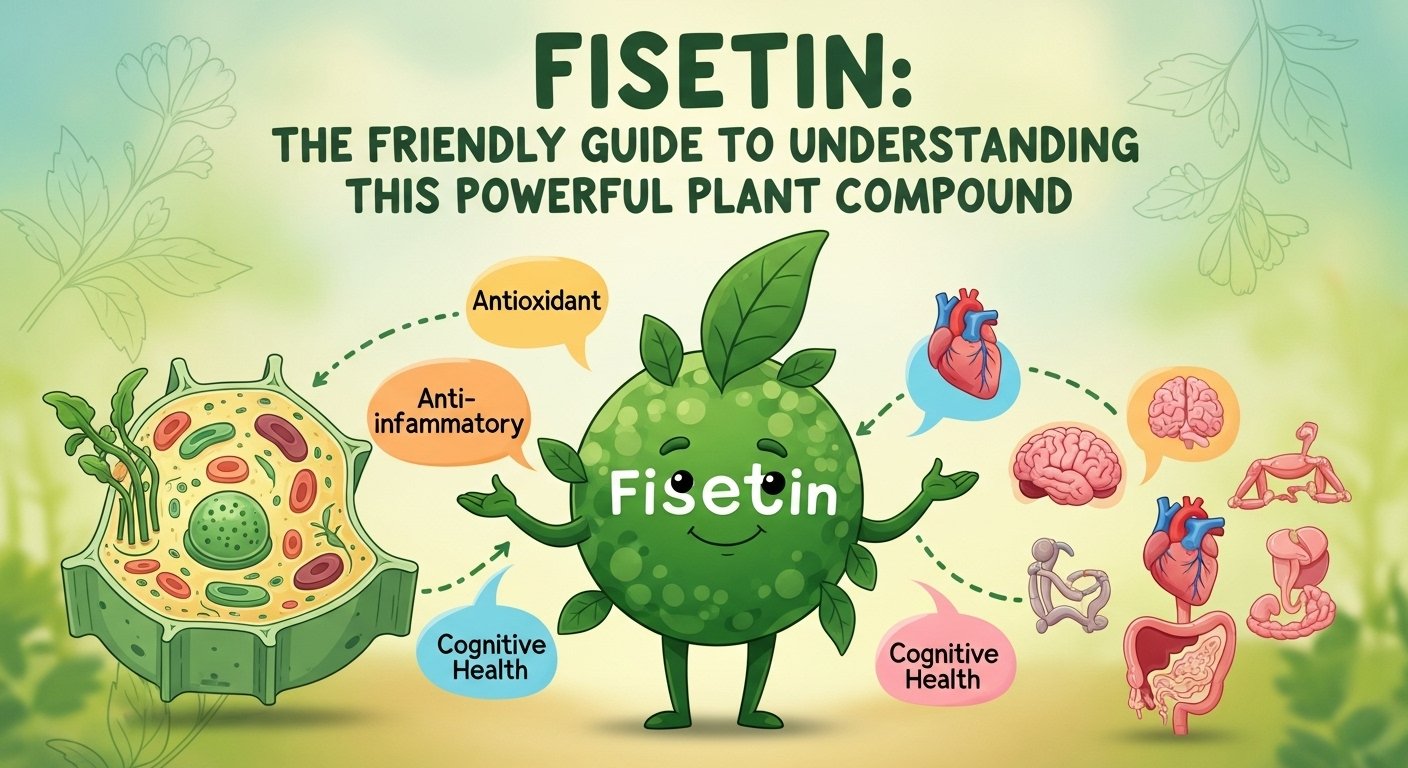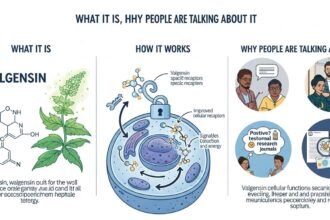Have you ever heard of fisetin? If not, you’re not alone! It’s one of nature’s hidden treasures, found in everyday fruits like strawberries and apples. Fisetin is a type of plant chemical called a flavonoid, and it’s gaining attention for some very exciting reasons. Scientists believe it may help you live longer, think more clearly, and stay healthier with age. Sounds interesting, right? In this guide, we’ll explore everything you need to know about fisetin in a fun, friendly, and simple way—perfect even if you’re just curious or new to health topics. Let’s dive into the world of fisetin and learn how this small nutrient could bring big benefits to your life.
What Is Fisetin?
Fisetin is a natural compound found in certain fruits and vegetables, especially strawberries, apples, onions, and cucumbers. It belongs to a group of plant nutrients called flavonoids, which are known for their antioxidant effects. That means fisetin can help protect your body’s cells from damage. It was first discovered in the 1800s but has recently gained more attention because of its amazing potential health benefits. What makes fisetin even more interesting is that it’s also considered a senolytic, which means it may help remove old, damaged cells from your body. That’s a big deal, especially when we talk about aging and staying healthy longer.
Where Can You Find Fisetin?
You don’t have to look far to find natural sources of fisetin. It’s hiding in some of the foods you might already eat every day. Strawberries are the richest source of fisetin, with high amounts per serving. Other good sources include apples, grapes, tomatoes, onions, kiwi, and persimmons. Even cucumbers and mangoes contain small amounts. Eating a variety of colorful fruits and veggies is one easy way to get fisetin naturally. If you want a more concentrated dose, fisetin supplements are also available in capsules or powders. These are often used in studies and by people looking for targeted health benefits.
How Does Fisetin Work in the Body?
Fisetin works by helping the body in several ways. First, it acts as an antioxidant, meaning it fights off unstable molecules called free radicals that can damage cells. Second, fisetin may reduce inflammation, which is the body’s response to injury or stress—but sometimes it gets out of control. Lastly, fisetin works as a senolytic agent, which means it helps clear out old or “senescent” cells that no longer work properly. These damaged cells can build up over time and may increase the risk of many age-related problems. Fisetin helps your body release and replace them with fresh, healthy cells so you feel better from the inside out.
Why Is Fisetin Linked to Longevity?
One of the most exciting things about fisetin is its possible link to longer life. Studies in animals show promising results: mice given fisetin lived longer and healthier lives than those that didn’t get it. This effect is believed to come from fisetin’s ability to remove damaged cells, reduce inflammation, and protect the brain. While we still need more research in humans, early data is encouraging. Scientists hope that supplements like fisetin could one day be part of anti-aging plans or healthy aging routines. Of course, no one thing guarantees a longer life—but adding fisetin could be one small step toward better health.
Fisetin and Brain Health: A Smart Connection
Fisetin isn’t just great for the body—it’s also a potential booster for the brain. Studies suggest fisetin may help protect brain cells, support memory, and even fight off age-related brain decline. In animal tests, fisetin improved learning and memory, and reduced signs of Alzheimer’s-like symptoms. Why? Because it lowers inflammation in the brain and protects neurons from damage. Some researchers even call fisetin a neuroprotective compound. While we can’t yet say it will prevent brain aging in people, it definitely shows promise. Adding fisetin-rich foods to your diet could be a smart way to support brain health naturally.
Can Fisetin Help with Inflammation?
Inflammation is the body’s natural way to protect itself, but when it lasts too long, it can become a problem. Long-term or chronic inflammation is linked to many diseases like heart problems, arthritis, and diabetes. Fisetin can help by calming the body’s inflammatory response. It does this by blocking certain chemical signals that lead to swelling, pain, or redness. In studies, fisetin reduced inflammation in the lungs, skin, and joints. People looking for natural ways to fight inflammation might benefit from having more fisetin through diet or supplements, especially when working with their doctor.
Fisetin as a Senolytic: What That Means
One of fisetin’s most talked-about features is its role as a senolytic compound. Simply put, senolytics help the body clear out senescent cells—cells that have stopped dividing and become “zombie” cells. These cells don’t die, but they don’t function correctly either. They can leak harmful chemicals and make nearby cells sick too. Fisetin helps get rid of these old cells so healthier, younger cells can thrive. This could improve many age-related health problems and help the body stay fresh and balanced. Researchers are very excited about fisetin’s senolytic abilities and continue to study how it might slow the aging process.
What Do Scientists Say About Fisetin?
Many scientists and health researchers see fisetin as a rising star in the world of health supplements. Studies on animals have shown that fisetin can reduce signs of aging, protect the brain, decrease inflammation, and even improve heart health. The Mayo Clinic and other well-known institutions have also looked into fisetin’s effects. However, most of these studies are early and have been done on animals or in labs. Human trials are starting to happen, but we still need more data to be sure. Still, the results so far are exciting and show real potential for future health care use.
How Much Fisetin Do You Need?

Right now, there’s no set amount of fisetin that doctors recommend. Since testing is still ongoing, most dosage ideas come from animal studies or small human trials. Some supplement brands offer fisetin doses between 100 mg and 500 mg daily, but this varies. It’s always best to talk to a doctor before starting any new supplement, especially if you take medication or have a health condition. If you prefer getting fisetin from food, enjoying more strawberries, apples, and onions in your diet is a tasty and healthy way to start.
Is Fisetin Safe to Take?
So far, fisetin appears to be safe for most people, especially when taken in natural amounts from food. In studies, even high doses of fisetin did not cause serious side effects. Still, supplements should always be used with care. Talk to a health professional if you’re pregnant, breastfeeding, on medication, or dealing with long-term medical issues. Fisetin hasn’t been studied as much in humans yet, so we don’t know everything. Start small, observe how your body reacts, and always use high-quality supplements from trusted brands.
Fisetin in Foods vs. Supplements: Which Is Better?
Getting fisetin from whole foods is a natural and safe way to add this helpful nutrient to your diet. Eating fresh fruits and vegetables provides many other vitamins, fiber, and antioxidants too. However, if you’re looking for higher doses for specific health goals like anti-aging or inflammation support, a supplement might be easier. Supplements can deliver more fisetin quickly, but they should be chosen wisely and not used as a replacement for healthy eating habits. Both food and supplements have their place, and the best approach might be a mix of both depending on your needs.
Real-Life Stories: People Using Fisetin
Some people who take fisetin have reported feeling more energetic, mentally sharp, or physically better. For example, Mark, a 52-year-old teacher, shared that he started taking fisetin supplements after reading about its brain benefits. Over a few weeks, he noticed clearer thinking and less joint pain in the morning. And while these stories are unofficial and personal, they show that fisetin may have real-life value. Sharing your experience with a doctor and tracking how you feel can help you decide if it’s right for you. Everyone’s body is different, so results may vary.
FAQs
1. What foods are highest in fisetin?
Strawberries are the richest source, followed by apples, onions, grapes, cucumbers, and persimmons.
2. Can fisetin really help with aging?
Early research suggests fisetin may help reduce aging effects by removing harmful old cells from the body.
3. Is fisetin the same as quercetin?
No, but they’re both flavonoids. They work in similar ways but have different chemical structures and benefits.
4. Can children take fisetin supplements?
Fisetin supplements haven’t been studied enough in kids. It’s best for children to get nutrients through food unless advised by a doctor.
5. Is fisetin safe to use every day?
Fisetin from food is safe daily. For supplements, most people tolerate it well, but check with your doctor before regular use.
6. Does fisetin help with memory?
Yes, some studies show fisetin may help protect memory and support brain health, especially as we age.
Conclusion
Fisetin is a powerful plant compound that could help protect your body and brain, keep you feeling younger, and fight chronic inflammation. While research is still growing, the potential health benefits make fisetin an exciting health booster to explore. Adding more strawberries, apples, and onions into your meals is a simple way to start. And if you’re looking for more targeted support, supplements may be another option to discuss with your doctor. When it comes to healthy aging and living well, small steps make a big difference—and fisetin might just be one of those steps worth taking.






